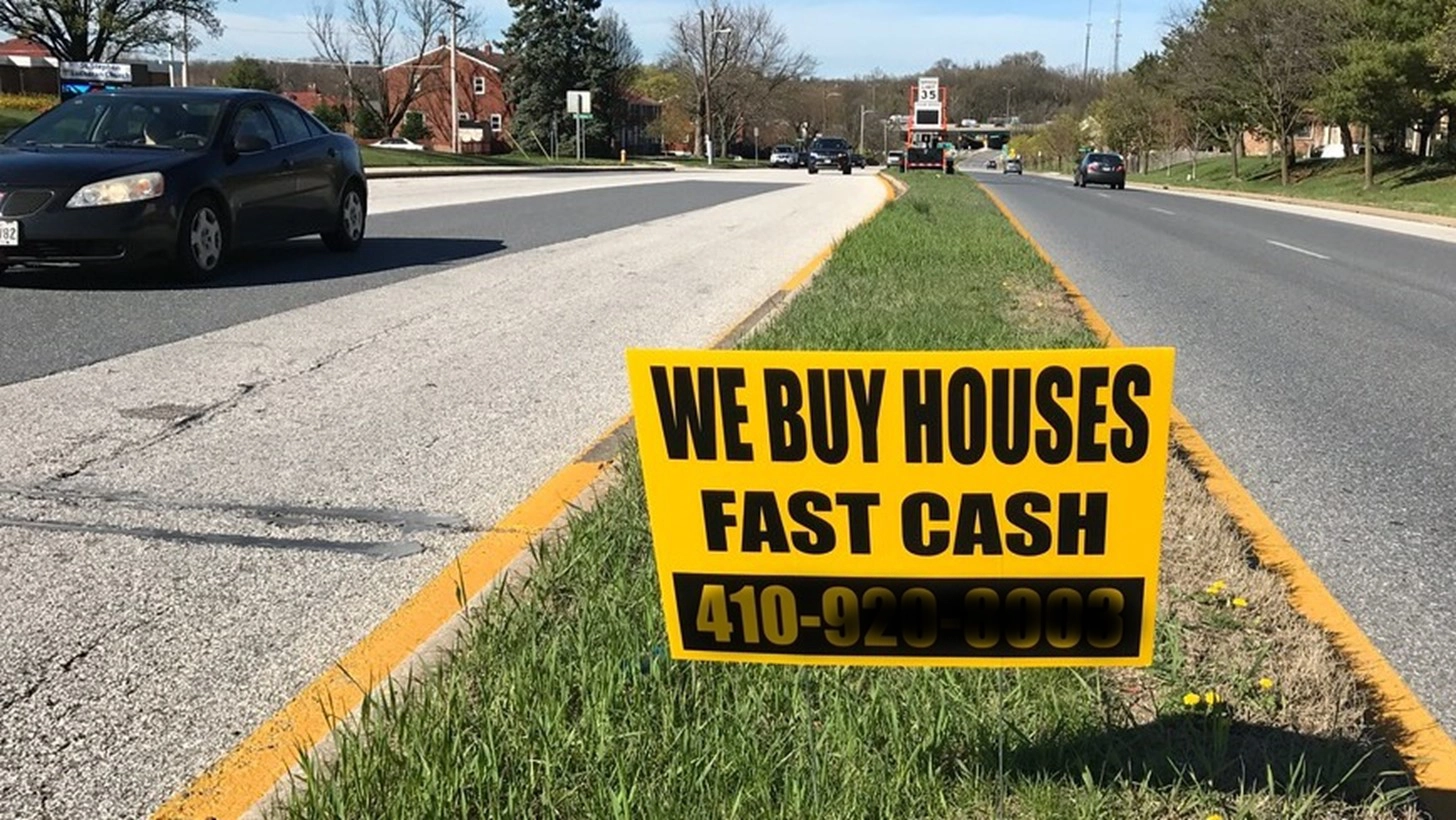
Tempted to sell your home quickly and easily to one of those “We buy any house” outfits?
Wait. Don’t even think about giving up that deed until you read this.
Look Out for Predatory Tactics, Pennsylvania Says.
Pennsylvania now regulates the “we buy your home” wholesalers. These are the businesses that put up road signs, send out text messages, voicemails, and leaflets, and even go door-to-door to get owners to sign contracts. Their core goal? Snagging homes for less than fair market value.
The “we buy your home” people come with purchase contracts. They are ready to give the deed holders a certain price. They also have end buyers lined up to immediately receive the homes. Some sellers have parted with their deeds, then seen their homes promptly listed on social media for substantially higher prices.
Using the wholesaling model, these salespeople don’t need to hold the deeds in their own names at any point. Indeed, wholesalers tout their ability to earn profits in the real estate market by controlling deeds — but not actually buying the homes.
Social media influencers promote wholesaling, offering tips and courses. But one person’s profit is another person’s loss. In some of these agreements, deed holders can lose as much in home value as they get from the wholesalers.
Perhaps There Ought to Be a Law…

That’s what Pennsylvania thought. Its governor, Josh Shapiro, just signed a bill into law that bans wholesaling without a real estate license. Wholesalers are about to be regulated. And that means, effective January 2025, the Pennsylvania Real Estate Commission will provide consumer protection for people who sell their homes to the “we want to buy your house” people.
Wholesalers also must explain to deed holders how the transaction works, and that sellers have a right to an attorney and an appraisal. And the law will make it easier for Pennsylvania deed holders to cancel these agreements. They’ll get 30 days to change their minds, or any time up until they officially transfer the deed — whichever happens first.
All Pennsylvania’s residential properties (that accommodate between one and four households) will now be afforded these consumer protections.
Philly Led; Pennsylvania Followed.
Several years ago, a collective that included Community Legal Services of Philadelphia and real estate agents’ industry groups worked to get a new law in place to protect deed holders in the city. So Philly’s consumer protections are already in effect. Here’s what the Philly provisions mainly do:
- Mandate city real estate licensing for residential real estate wholesalers.
- Require wholesalers to inform the people they pitch their services to about related consumer rights.
- Maintain a registry, known as the Do Not Solicit list, so deed holders may shut off unsolicited “we want to buy your home” messages.
Philadelphia deed holders targeted by unlicensed wholesalers have the legal right to get out of the contracts. There’s also a buffer of waiting time from when a deed holder is told their rights, and when they can sign an agreement.
The new Pennsylvania law isn’t new after all. It’s just following in Philadelphia’s footsteps.
Oregon’s Making a Similar Move.
As Deeds.com noted earlier this year, Oregon’s governor has signed a similar bill into law. Oregon’s law, too, goes into effect in January 2025. It’s the first time Oregon has ever taken steps to hold residential real estate wholesalers accountable to a set of legal standards and limits.
There are other similarities between Pennsylvania’s and Oregon’s new deed wholesaling laws. In Oregon, both housing advocates and agents’ groups pressed for regulation, calling it a matter of transparency and necessary consumer protection.
Oregon’s new law overhauls its real estate regulations. For starters, it requires brokers to have written agreements with their buyer and/or seller clients. All agents and brokerages, wholesalers included, must give both sellers and buyers their contact details and other assurances of transparency and fair dealing.
Other provisions in Oregon’s law are about to:
- Bring buyers and sellers into agent fee-setting decisions. Oregon brokers may not promise to share agent commissions with buyers. They can negotiate fees, though, in an open, transparent process. So, buyers’ and sellers’ agents will no longer be allowed to make behind-the-scenes fee-splitting rules.
- Ban cash for listings. A cash for listing offer commits a deed holder who accepts a sum of money to working only with one particular broker should they ever sell their homes. Marketed as “benefits” to the sellers, these contracts lure elders and financially struggling homeowners into contracts that control their deeds beyond their lifetimes in some cases.
Also of note, Oregon has established a registration portal for people engaged in deed wholesaling. It’s managed by the Oregon Real Estate Agency — the state office to which all brokers report.
Other States Are Weighing In.
Here are a few other states to have entered the fray:
- Illinois was a frontrunner. Determined to stop people who preyed on struggling deed holders’ home equity, the state outlawed residential real estate transactions by unlicensed people effective 2020. Hefty fines are included.
- Just a bit later in Oklahoma, lawmakers passed the Predatory Real Estate Wholesaler Prohibition Act. It went into effect in late 2021.
- South Carolina has effectively banned residential property wholesaling. Bad press about some actors involved in the practice influenced this lawmaking.
- Ohio law penalizes abusive cases of wholesaling, with fines up to $1,000 per day.
- Iowa’s law regulating wholesaling just took effect in July 2024. It forces disclosures about the wholesaling model to deed holders. It allows them to cancel if wholesalers don’t follow the law. It also imposes significant fines for noncompliance. Arizona has passed a similar provision.
- In Texas, wholesalers have to follow disclosure rules, and the practice is being studied for possible future lawmaking.
Virginia now regulates wholesalers as brokerages. In Kentucky and in several other states, too, unlicensed salespersons aren’t permitted to engage in wholesaling.
And the wholesaler influencers don’t seem too happy about all these regulatory moves.
For the Wholesaling Business, Is the Writing on the Wall?
One thing seems clear. Those who market deeds they don’t hold, and reassign their contracts to other buyers, could be engaging in unlicensed real estate deals. And such deals are increasingly under scrutiny. If deception, lack of disclosure, or unfair play is involved, people get hurt, and state lawmakers feel the pressure to act.
In short, the legal trend is to support deed holders, and curb predatory businesses looking to suck profits out of other people’s homes.
Supporting References
Michaelle Bond for the Philadelphia Inquirer and reprinted in the Seattle Times: Can New Pennsylvania Law Protect Homeowners Against “We Buy Houses” Hustlers? (Jul. 22, 2024; originally titled A New Pa. Law Expands Philly’s Homeowner Protections Against “We Buy Houses” Hustlers).
Deeds.com: Legal News – Oregon Starts Restricting Real Estate Wholesalers (Apr. 12, 2024).
Oregon House Bill 4058 – Relating to Regulated Real Estate Activities, signed as ORS Ch. 696 on Mar. 7, 2024. See also: Regulating of Real Estate Activities.
Joseph and Joseph and Hanna via JosephandJoseph.com: Wholesaling Real Estate in Ohio – Do You Need a Broker’s License?
And as linked.
More on topics: Home flipping, Real estate and the gig economy
Photo credits: Baltimore Heritage (public domain), via Flickr; and Axcordion, via Wikimedia Commons, under GNU Free Documentation.
